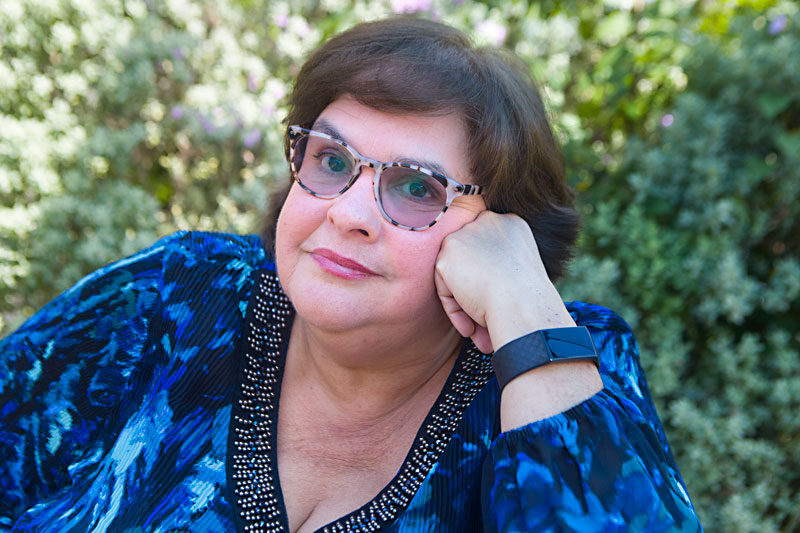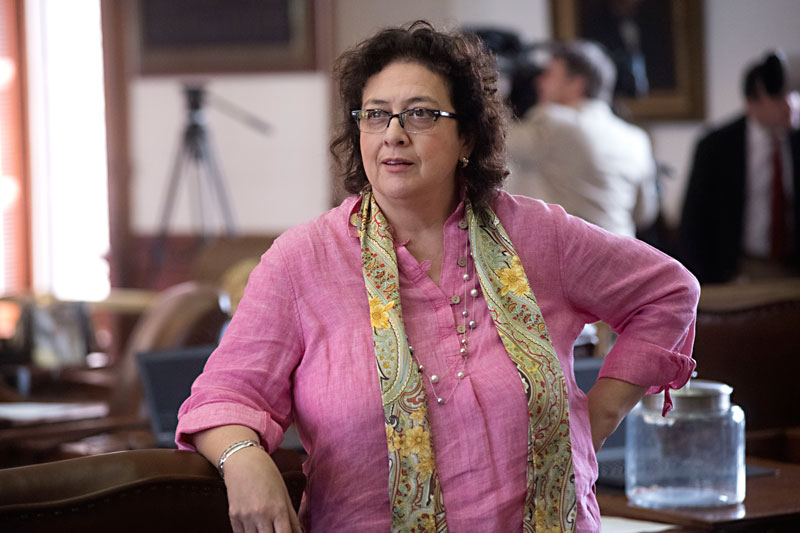Ellen Richards with Integral Care (l) & Karen Ranus of NAMI (Photo by Jana Birchum)
When Karen Ranus lost her mother to a terminal brain tumor, casseroles baked by her friends and neighbors appeared at her doorstep. Those same friends offered to mow her lawn and pick her children up from school. Ranus knew her community supported and cared for her family during a crisis. Fast-forward 17 months, when Ranus and her husband brought their daughter home from the hospital after a suicide attempt. There were no casseroles.
“I own the fact that, in my mother’s case, I’m quite certain I posted something on Facebook about it,” said Ranus. “I can assure you that when I brought my daughter home I didn’t do that.” The stigma of suicide and mental illness caused a snowball effect in Ranus’ family. First, her daughter thought her depression meant there was something wrong with her – that she was abnormal. Then it was Ranus and her husband who “felt ashamed in the sense that we had failed.”
Now the executive director of the Central Texas division of the National Alliance on Mental Illness (NAMI), Ranus explained: “Here we were making sure she had access to everything she needed in terms of care … but this cloud hung over us that no one really spoke of or named. But I know now it was shame.”
Shame and stigma, especially in times of crisis, have made it difficult (and at times impossible) for those suffering to get the care they need. “I often say – it was both the way we responded to it, and the way our friends, family, and community responded to it,” Ranus added, noting that the lack of support during her daughter’s struggle was “not reflective of the people in my life” – that there would have been empathy and caring if people could approach mental illness as they do physical illness. Instead, “We carry the shame ourselves and it just sits there [because people] still don’t know that … by all means, bring a casserole over, because we’re navigating a really serious health issue and yeah! It would be great to have a King Ranch chicken casserole.”
In the U.S., one in five adults will experience a mental illness in their lifetime, while one in 25 Americans lives with chronic serious mental illness. According to a new report from the Centers for Disease Control and Prevention, suicide rates continue to increase – 33% from 1999 to 2017, with many less-advantaged groups (such as indigenous women) being hit especially hard. The last time suicide ran this rampant in the U.S. was during World War II. In Travis County, according to the Medical Examiner’s Office, two children under the age of 15 committed suicide in 2018. Another 15 teenagers and young adults (16-20) took their own lives last year, as did 34 adults aged 21-30. In total, 158 Travis County residents ended their own lives in 2018.
Those numbers, while staggering, may be just the tip of the iceberg. Women, according to the National Council for Behavioral Health, are twice as likely as men to attempt suicide or to experience depression, anxiety, and post-traumatic stress disorder. Twelve million U.S. women are living with depression each year; 10-15% of new mothers are plagued with postpartum depression, while another 9% experience postpartum PTSD. Even young girls are experiencing mental illness at higher rates: Ranus noted that suicide rates for girls aged 10-15 have tripled recently, which, though the number remains small, is still cause for concern.
“We’ve got to talk about this,” said Ranus, who, along with Integral Care Chief Strategy Officer Ellen Richards, believes talking about the realities of mental illness is one powerful tool to help dispel the stigma currently shrouding this public health crisis. Across the country and right here in Austin, more and more women are coming forward to share their stories, carry the conversation, and ultimately change how the community looks at and responds to mental health. While half of all mental illness is diagnosable by the age of 14, Ranus said there’s often an eight- to 10-year gap between the onset of symptoms and treatment.
Pointing to celebrities like Kristen Bell, who’s publicly acknowledged her depression and anxiety, Richards noted that Integral Care (Austin’s local public mental health authority) and NAMI are working together to “change the conversation locally by reducing the stigma around talking openly about the conditions people live with.” Sharing stories, she said, gives people hope and offers real-life examples of others moving toward recovery. Not talking about it keeps the issue hidden and often stops people from accessing care.
Lawmakers are both speaking up and listening. Ranus, Richards, and Austin state Reps. Celia Israel and Sheryl Cole agree that mental health care is one of the few issues with bipartisan support at the Capitol. The final biennial budget approved by the 86th Texas Legislature included $4.4 billion toward mental and behavioral health (beyond spending within Medicaid and the Children’s Health Insurance Program), another $342 million for early childhood intervention, and additional measures and dollars to better support the state’s mental health efforts. The Lege’s support, said Richards, has been evident for the last several sessions: “Texas has really made significant strides in expanding access to services by putting more money in the budget.”
Legislators also approved a $165 million budget rider to rebuild Austin State Hospital, which Richards called an “enormous win” locally, regionally, and statewide. ASH is one of 10 state psychiatric hospitals and serves a 38-county region (75 counties for children and youth). The overall ASH redesign – including both the new hospital facility and future investments in the Central Austin campus – seeks to transform how Texas approaches brain health. Ranus noted: “The redesign isn’t just about a building, but how we pay attention to the systems in place and the policies. How do we change those as well?” Those policies include the ongoing decriminalization of mental illness – a plan Travis County Sheriff Sally Hernandez supports and is putting into action with the help of both NAMI and Integral Care.
Programs intended to divert from jail those who are experiencing a mental health crisis have taken root in local law enforcement with the aid of Integral Care’s Mobile Crisis Outreach Team (MCOT), which is dispatched through Integral Care’s crisis hotline and when called in by first responders. MCOT often takes over for officers or EMS when a patient doesn’t need to be arrested or transported to an emergency room, but does need mental health support. In the courts system, County Court at Law Judge Nancy Hohengarten started the Austin/Travis County Behavioral Health and Criminal Justice Advisory Committee in 2012 – a countywide partnership to support those with behavioral health needs while also ensuring public safety. Today, that committee is chaired by District Judge Tamara Needles.
Still, notes Ranus (whose office is located on the grounds of Austin State Hospital), “We can provide all kinds of services and have a robust system” and work to educate and support families (which NAMI does), but “if we don’t change the conversation in schools, workplaces, faith communities, in our neighborhoods, that work is almost futile. Because you still have families sitting quietly, not getting casseroles. We really have to transform the entire community’s approach.”
Sally Hernandez
Before she was elected sheriff of Travis County in 2016, Sally Hernandez spent 30 years in law enforcement watching people in the throes of mental health crises move in and out of the criminal justice system. At the time, she recalled thinking, “We’ve got to do better,” but added: “It’s easy for all of us to rely on someone else to push it forward. But for those 30 years – I hate to admit – it didn’t push forward. It was getting worse.” As she began considering a run for sheriff, Hernandez – at the time the Travis County Pct. 3 constable – realized the “ta-da” moment she’d always hoped for would be up to her to figure out.
Sheriff Sally Hernandez (Photo by John Anderson)
“We have to start the conversation so people know it’s OK to talk about it.” – Sally Hernandez
Hernandez reached out to Integral Care and NAMI, where she learned about diversion efforts, officer trainings, and the personal side of mental illness. Hernandez recalled the story of a young woman named Kate, who suffered from an unknown mental illness, self-medicated, and landed in jail before she ever got help. But Kate found NAMI, and eventually found a job there as well. “That day, I saw [that] you can go from crisis to hope,” Hernandez told me. “If this can happen for Kate, how many people can this happen for? We need more positive stories, because positive stories moved me.”
Since taking office in 2017, Hernandez has co-chaired the county’s Children’s Mental Health Crisis Task Force, which surprised many people at first. “They all said, ‘You don’t deal with children,’ but I said ‘Oh no, if we don’t help them now, I’m going to be dealing with them.'” The task force was created to examine the current system and create a countywide support network to empower children and families, one of Hernandez’s chief goals. Toward that end, Hernandez partnered with NAMI and Integral Care to improve the outcomes for inmates living with a mental illness. Today, NAMI leads a bimonthly class at the county jail for family members of inmates with mental health issues. Attendees learn what to do when a loved one goes into crisis, how to recognize the signs, and where to access additional resources. Attendees are also granted additional visits with their loved ones.
Both Integral Care and NAMI also lead trainings to help officers understand mental health and navigate crises. In fiscal year 2018, Integral Care trained 1,079 first responders from TCSO, Austin Police, and EMS to help divert individuals from jail. The TCSO has also begun using Integral Care’s MCOT to divert people in crisis from arrest; Hernandez said her office is also working on diversion programs for low-level charges, such as criminal trespass. Hernandez concluded: “We have a lot more to do … but we have to be proactive. We have to start the conversation so people know it’s OK to talk about it. That’s how you end stigma.”
Kendall Antonelli
A native Texan, Kendall Antonelli – co-owner of Antonelli’s Cheese Shop, which she runs with her husband – had what she calls a “pretty challenging college experience.” Within two years of moving to Washington, D.C., to attend Georgetown University, Antonelli lost her father and grandmother, and supported her mother through a battle with colon cancer. A child of earlier divorce, Antonelli was already seeing a school counselor to cope with loss, but one night, she said, “I just broke.” She found herself in Georgetown Hospital’s psychiatric ward.
Kendall Antonelli (l) with her children Elia and Everett in 2015 (Photo by John Anderson)
Antonelli hopes to be “an example of someone else who made it through.”
Behind the hospital’s locked doors is where Antonelli says her “real transformation” toward getting healthy began. She spent the summer at home with her mom and new dog, attending therapy sessions, exercising, and resting in an effort to create a routine. And there was medication, too. “I always say mental health challenges and stories are unique to each person, and their roads to recovery are unique to them,” explained Antonelli. “But I’m grateful for whatever recipe of hard work, therapy, medication, support, and magic/faith/love went into my healing process.”
When summer ended and she returned to school for her senior year, Antonelli was better equipped to care for herself and recognize her triggers. Eventually, she said, “I had sort of worked through” the depression that landed her in the hospital months before.
As a business owner, entrepreneur, and local activist, Antonelli has chosen to talk openly and honestly about her story to help those “still in that deep dark hole” know they’re not alone. For Antonelli – who said the hardest part of her journey was the feeling of isolation – learning that her grandfather also suffered from and was hospitalized for depression offered some relief. Years later, Antonelli hopes to be “an example of someone else who made it through.” More so, she hopes to “reach those folks who just don’t get it. [Because] those of us going through a mental health challenge should be able to talk about it and get the help we need, and we can’t do that when stigma surrounds it.”
She sees that stigma slowly disappear when she shares her own story and others, in response, share theirs. Some folks, Antonelli said, have come directly to her for support – including mothers concerned about their children. As a NAMI supporter, Antonelli offers resources and referrals in return. “It’s just about taking small steps and shining a light on mental health awareness.” That, she said, “makes a difference.”
Deborah Rosales-Elkins
Today, Deborah Rosales-Elkins is a peer support specialist at Integral Care, but for years – ever since her teens – she struggled with her mental health. “I went through this trajectory of getting on medication, feeling better, and then thinking, ‘I’m a bright, strong woman, I don’t need medication, I can navigate this on my own,’ [going off medication], and getting sick again.”
Deborah Rosales-Elkins (Photo by Jana Birchum)
It wasn’t until she lost her nephew to suicide a couple of decades ago that Rosales-Elkins decided it was time to make a permanent change. As a mother of five kids approaching adolescence, she wanted to both protect herself and ensure her children could navigate the reality of mental illness in their family. “I started looking into all the models I could learn about,” Rosales-Elkins recalled. For her to maintain control, she knew she had to “create a care team” of friends and colleagues to “help me navigate the impactful things I’ve learned to maintain my health.”
Now at Integral Care, Rosales-Elkins is part of others’ care teams. Working in the bipolar clinic, Rosales-Elkins supports clients who are just beginning their journey to recovery, a path she both recognizes and understands. Though not a medical expert, she explained: “I am an expert on the impact of this disease.” Her role is to share the nonmedical side of maintaining recovery, because “the way I look at it – the more tools you provide to people, the more they can pick and choose what works for them.” Her history – and her willingness to share it – sparks an “instantaneous connection,” as she described it. “When I tell new clients I’m in bipolar recovery, happily married, and [have] raised five resilient, successful kids … I had a client burst into tears and ask, ‘Are you telling me I can have that too?'”
That success works both ways. “This heals me … and keeps me on course as well. [My clients] turn around and serve me by giving me so much hope.” Rosales-Elkins is also quick to credit other organizations working to support her clients, such as the Austin Clubhouse run by Joanna Linden, which mimics a workplace setting and provides a safe space for people living with mental illness to come and connect within the larger community.
Returning to her nephew, Rosales-Elkins pointed to the silver lining of her family’s loss. “If anything good can come out of the tragedy … it helped our family take this disease by the horns. I think that’s the power of being open, of women and men stepping forward and sharing their stories. These struggles can be overcome.”
Rep. Celia Israel
Celia Israel talks openly about mental health to support and save our youth. This last legislative session, Israel again filed her bill seeking to ban conversion therapy in Texas (the pseudoscientific practice of trying to “fix” queer kids by “making” them straight). Though House Bill 517 didn’t make it out of committee, Israel considers the bill’s first-ever hearing in the House Committee on Public Health a victory. “I’ve filed that bill three times now. To at least get a hearing and take the hood off the fact that these people are calling themselves mental health providers, charging a fee for their services, and telling parents, ‘I can fix your kids’ – it’s doing harm in so many ways.”
Rep. Celia Israel (Photo by John Anderson)
As a whole, Israel said the state has done better with each passing year to protect Texas youth.
Israel, who struggled as a gay teenager and had her own brush with suicidal thoughts, found herself calling upon the “younger version of myself a lot this session.” Looking back, Israel said she’s careful to not just say “LGBTQ kids,” because “some kids don’t know what they are. They just want to be kids. Nine-year-old Celia didn’t know what she was, but she wanted to wear high-tops and she could name every member of the Dallas Cowboys team. And she was happy. But other people tried to make her feel weird because of that. So for me, when you talk about mental health issues, I’m thinking about just allowing kids to be kids.”
A year has passed since Israel first shared her personal story in the Pflugerville Pflag, inspired at the time by the high-profile suicides of Kate Spade and Anthony Bourdain. A good friend told her the most powerful thing she could do was talk about mental illness, and the response Israel received from sharing her story confirmed her friend’s truism. “My social media blew up and I was reminded again: People are watching, and they appreciate you being honest. There are those kids who are made to feel weird when they’re 8 years old, and by the time they’re 17, they might not want to live anymore. If we don’t have the resources to make sure they’re taken care of, then it’s on us.”
As a whole, Israel said the state has done better with each passing year to protect Texas youth. One of this session’s wins came when Gov. Greg Abbott signed into law Senate Bill 11 on June 6, creating the Texas Child Mental Health Care Consortium to improve the state’s care system for children. While Israel, with her infinite wit, believes “girls are smarter than boys,” she admits that as a lawmaker in the minority party, there’s only so much she can do. So she applauds Rep. Four Price, R-Amarillo, who in past sessions chaired House select committees on mental health and substance abuse, for “moving the ball forward.” Calling him a champion, Israel credits Price for rolling up his sleeves and acknowledging “this is a good, bipartisan win for us.”
Progress, Israel said, is also being made on insurance coverage reform that can help kids get mental health care coverage. “We’ve got a lot of significant small rocks that are going to equate into one big rock over the course of several years.” As for conversion therapy, Israel gave an unequivocal yes when asked if we’d see the end of the harmful practice in her lifetime. “We’re all accountable to voters who want to see us getting work done. I suspect that’s why we were able to move forward with more mental health bills this session – voters don’t want us fighting over who gets to go into whose bathroom.”
A version of this article appeared in print on July 5, 2019 with the headline: Saying No to Shame
















